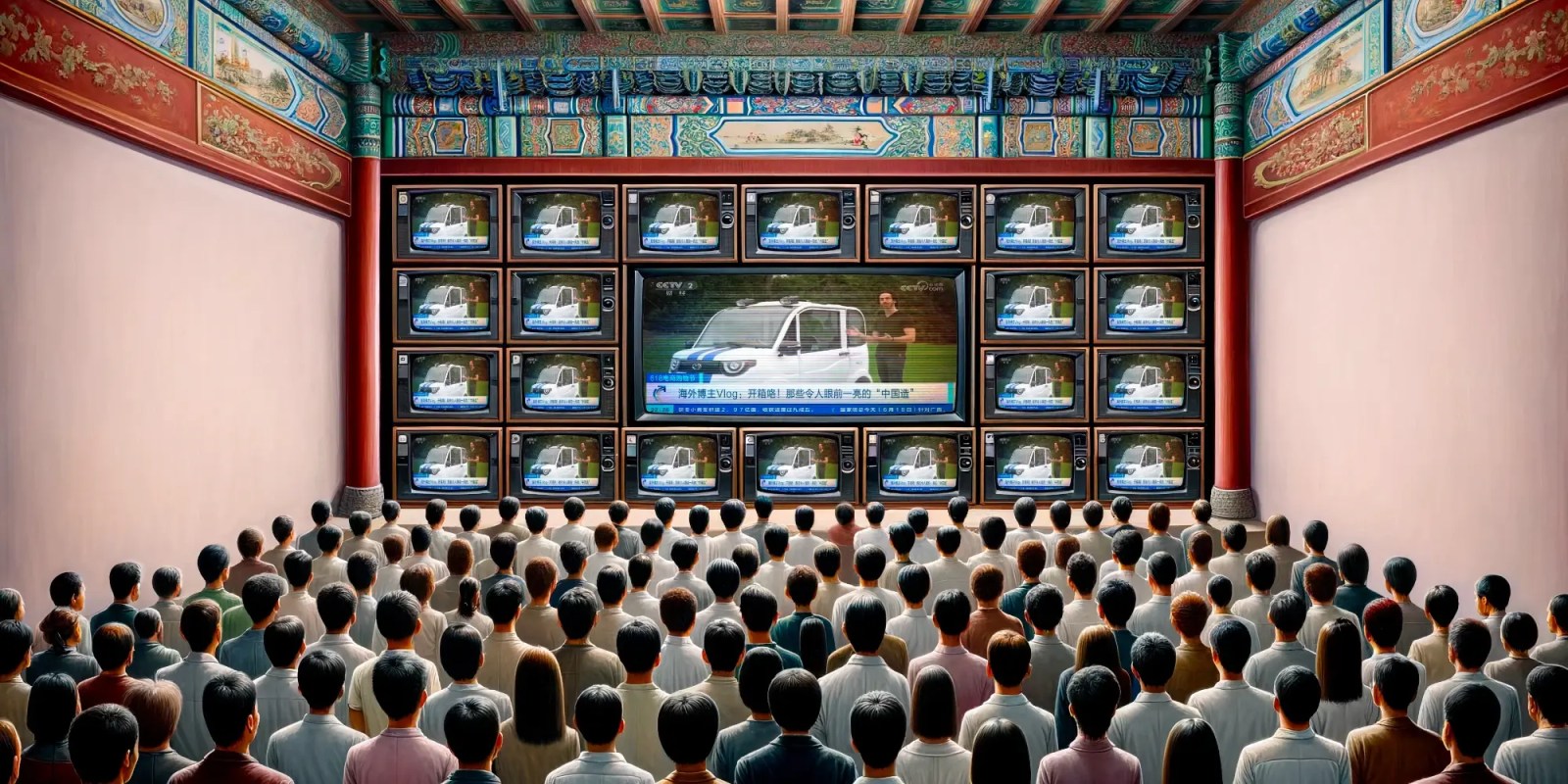
A fascination with electric vehicles isn’t anything new. These days, everyone and their brother seems to have an EV. But I’m not one of the “normal” electric vehicle enthusiasts. I’m drawn to the more oddball designs. And that zeal has seen me end up in some weird places. Most recently, it had me end up on a hundred million TV screens across China.
In addition to my day job/passion of being one of the most prolific propagators of electric bike news and reviews on the internet, I moonlight as a broader lover of weird Chinese electric vehicles. You may have even seen my weekly column, the Awesomely Weird Alibaba Electric Vehicle of the Week.
It mostly started as a lark, the inevitable result of my publisher and I trying to best each other at who could find the weirdest cars on China’s massive shopping website, Alibaba.
Inevitably, they’re almost all electric due to the simple fact that China has quietly led the world in the development and adoption of EVs. Their range of EVs, both the realistic and the fanciful, is nothing short of awe-inspiring. Norway may lead the world in adopting electric vehicles, but frankly, anyone can buy an EV. It’s China that leads the world in designing and producing them.
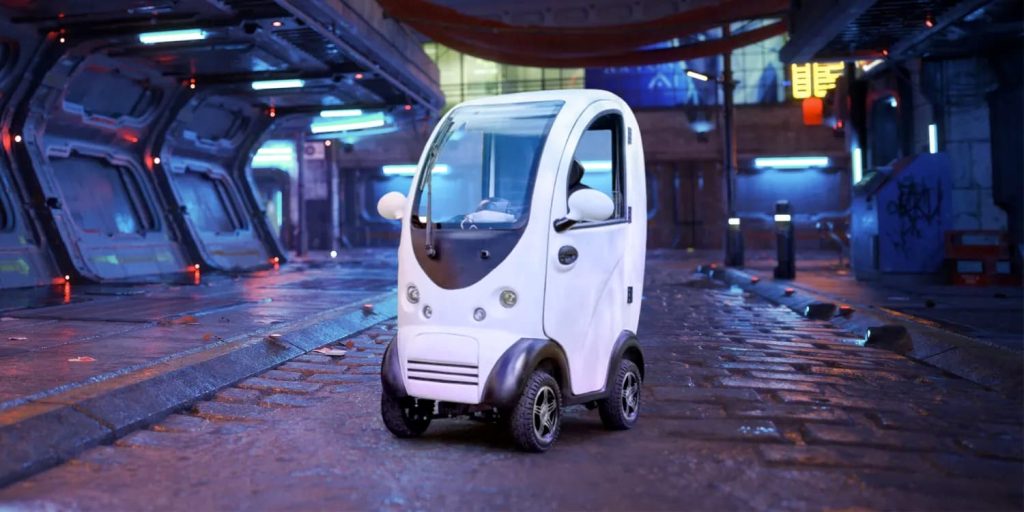
So there we were, my publisher and I chuckling at just how many fun and sometimes bizarre EVs we could find that were produced in China.
I’d toss him an electric replica of a horseless carriage that looked like it belonged in a live-action Cinderella movie. He’d follow up with an electric mini-truck with fold-out solar panel wings. I’d try to top it with a food truck built on the back of an electric bicycle.
After discovering just how deep the rabbit hole to China went, I was hooked. And I had a sneaky suspicion that the rest of the world just might be as interested in the madness as me.
It became a recurring theme each week in the column. And having our talented graphics guy Michael Bower magically transplant me into every vehicle each week certainly helped.
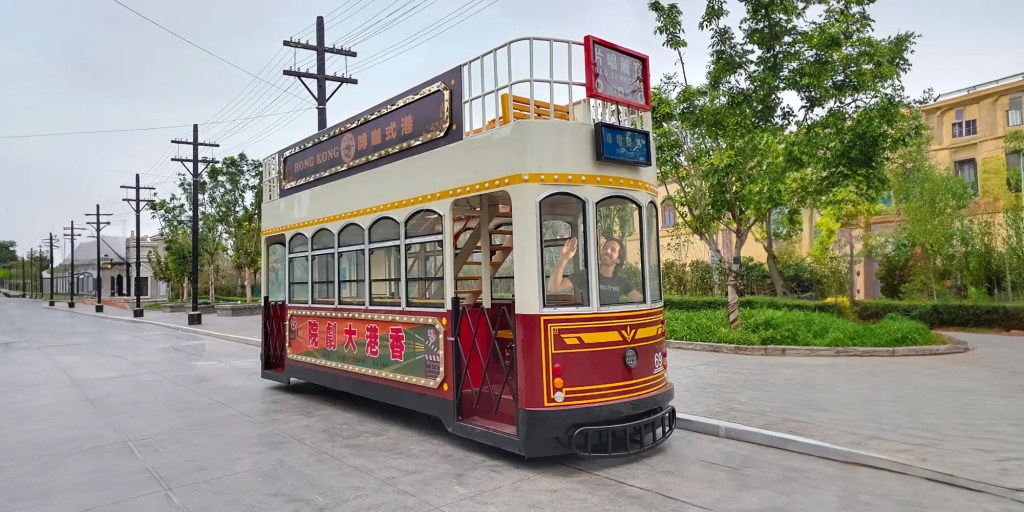
Over the last few years of hunting down the weirdest electric vehicles in the world, I’ve come across some real doozies. The three-wheeled electric RV was a top contender for a while, though who could pass up your own fully functional electric submarine for exploring the ocean’s depths? And where would we be as a society without the world’s tiniest electric police car?
But I also soon discovered something interesting. In addition to super-weird offerings on Alibaba, I was also finding electric vehicles that I actually wished I could own.
How could I resist a bare-bones electric snowmobile or a one-seater speedboat?

When I eventually came across a $2,000 electric mini-truck that looked like a knock-off Ford F-150 that took an unintended trip through the washing machine and dryer, that’s when things changed. It went from “Man, it’d be funny to buy one of these…” to “Uh oh, I think I need to buy this thing.”
I spent months working out the details with the Chinese factory, finding the right customs brokers, getting the paperwork done, and then eventually getting the mini-truck on a boat and headed to the US.
After what felt like an eternity, it finally arrived. And I was immediately in love. What was unobtainable in the US was suddenly driving around my parent’s ranch in Florida. I had an electric mini-truck, complete with air-conditioning and a hydraulic dump bed, that had traveled halfway around the world from China to my fingertips. I was giddy.
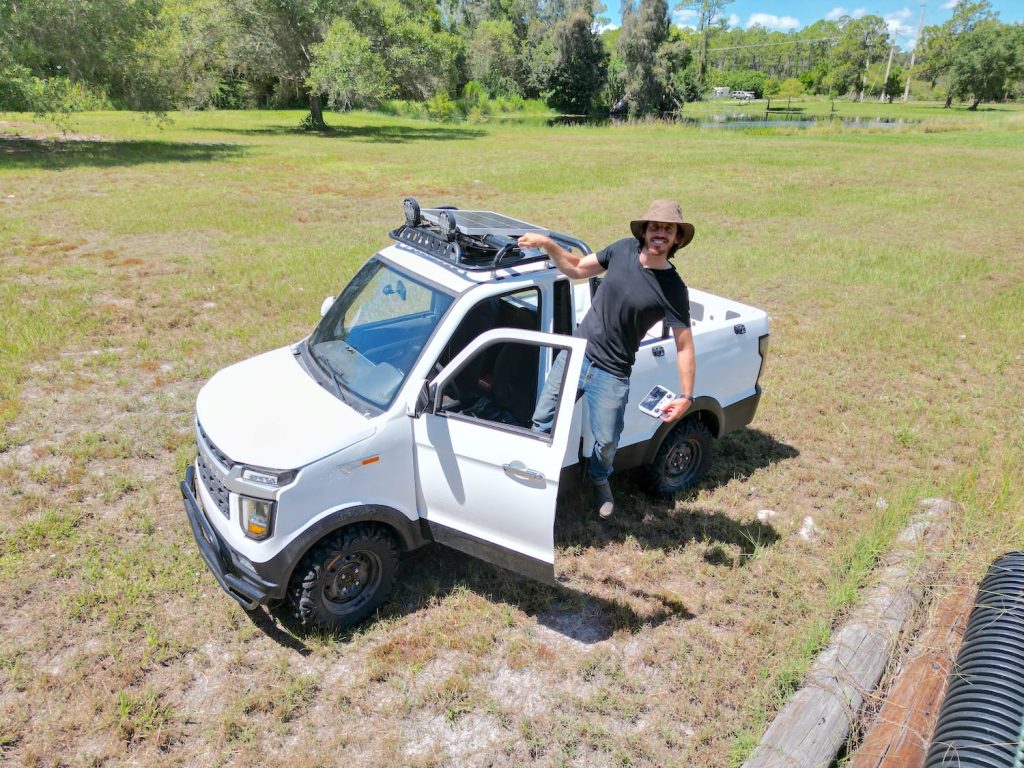
And as it would turn out, I wasn’t done. In fact, I was just getting started.
The more I found weird electric vehicles from China, the more I wanted to add to my collection.
Unfortunately, a little thing called economics (or more colloquially known as convincing one’s wife that purchasing something stupid is actually a great idea) made this endeavor more difficult. There was a lot of weird stuff out there, but I had to be picky. I couldn’t afford not to. So I focused on the stuff that seemed the most useful to me.
That’s how just a year later I wound up with a five-seater electric boat slowly puttering its way around the local lake. And more recently, I became the proud new owner of electric construction equipment, including an electric mini-excavator and an electric loader.
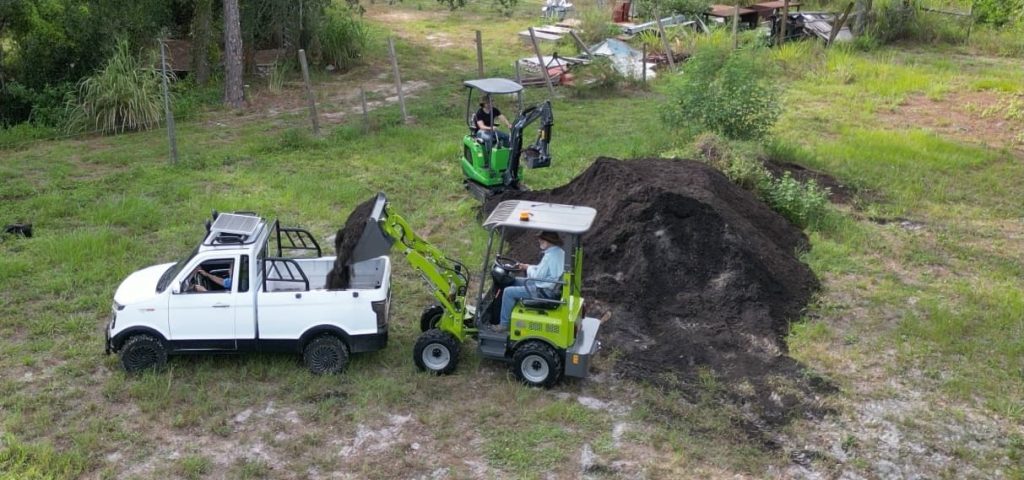
Along the way, people started to take notice. I made videos of my escapades, and they began going viral. That electric boat found over 3 million views on YouTube. And remember my electric mini-truck from above? Over 10 million views. I wasn’t the only one enjoying these things anymore.
In fact, the news had gone full circle, landing back in China. A maker of electric micro-cars in China (known locally as “happy grandpas” based on their typical users) wanted me to check out their newest model and sent one to me for an unboxing.
A few months later there was a massive wooden crate in my family’s driveway. It was wild.
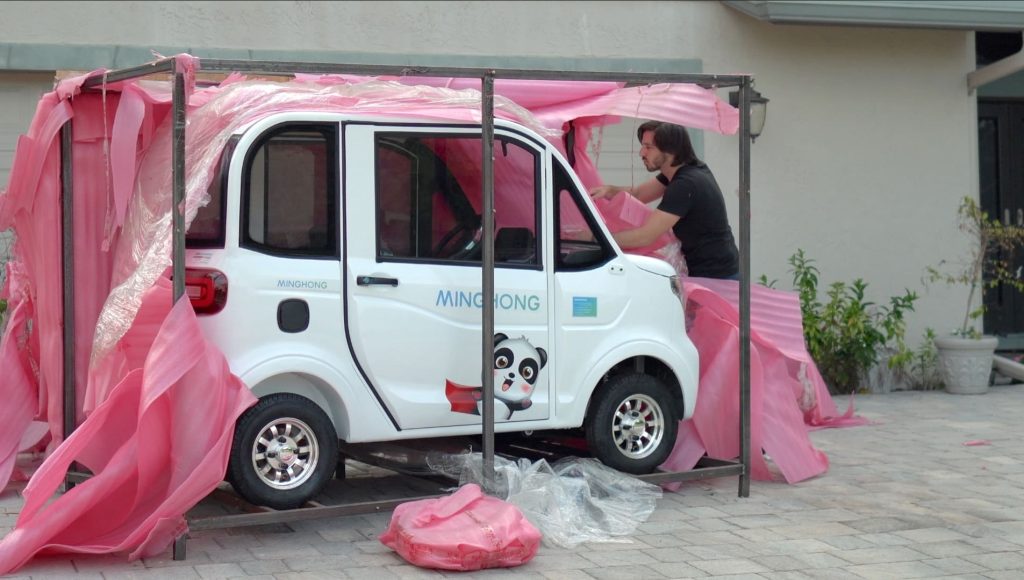
The word continued to spread. One morning, I awoke to an email from someone saying they represented a news channel in China, something called “CCTV”, and asked if they could do a story on me. The name didn’t mean much to me, so I asked a Chinese friend of mine if they had heard of the news station. “That’s… the biggest channel in the country,” he said. “You should do it.”
As it turns out based on what Wikipedia told me, China Central Television, or CCTV, claims to have a regular viewership of over 500 million people. Those are the figures from their own survey, but I believe it. Why? Because all local news stations in China are required to run CCTV’s daily news broadcasts in addition to their own programming. That’s state media, for you.
Any potential issues with that aside (and there are many), I was curious to see what Chinese state media would think of me, a Westerner who has a weird fixation with procuring odd Chinese vehicles.
As someone who has once or twice been referred to as a journalist himself, I figured there’d soon be an interview. They’d ask me a few questions. Maybe I’d share some fun stories. We’d all crack a fortune cookie and laugh about my quirky antics.
Nope.
Apparently, they had all they needed from my YouTube videos. The exact story wasn’t important, not when they could read between the lines.
A week or so later, there was my goofy face smiling out to half a billion charmingly confused Chinese people.
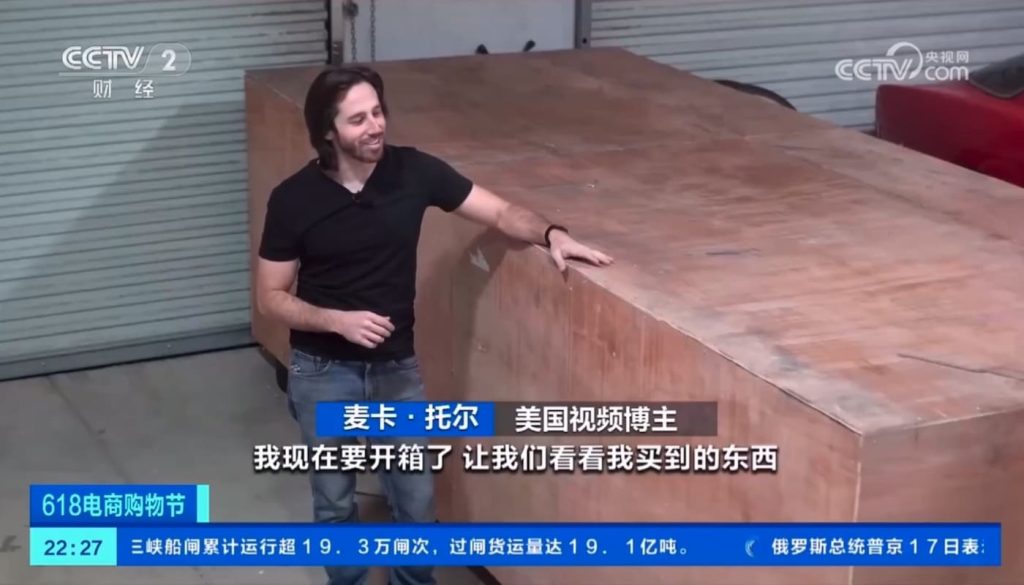
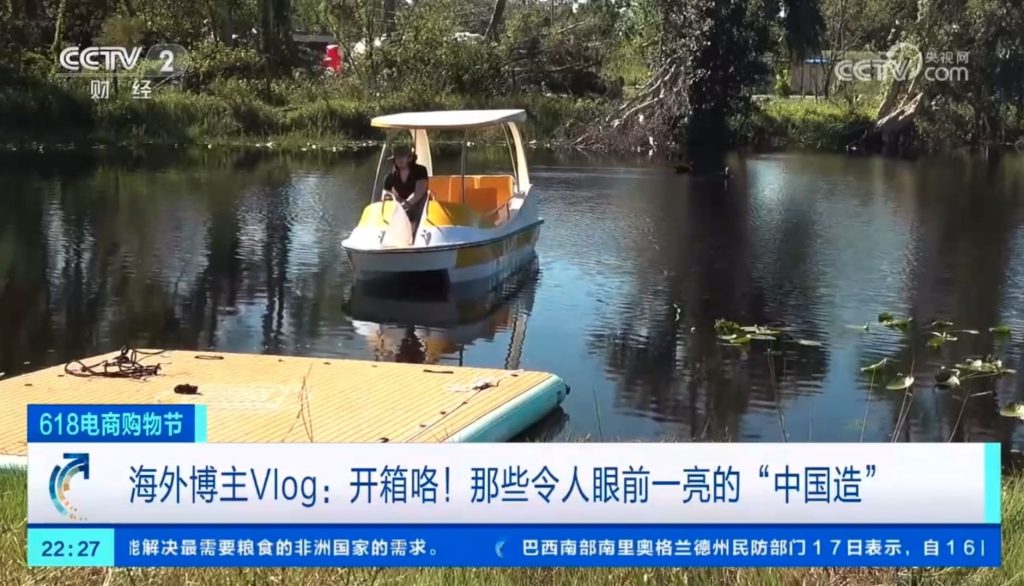

The news show had basically just taken several of my YouTube videos, cut out a few select clips of me showing off the features of my electric boat, then added some voiceover.
With the help of a translator app and a friend who speaks Mandarin, I was able to piece the story together.
Basically, they made a cute little puff piece about Chinese products being bought by randos on the internet. Case-in-point was me and my electric boat, to which the adorable presenter directed the audience’s attention.
They showed me unboxing my boat, followed by demonstrating its features and testing it out along with my dad in the local lake.

It was a surreal experience, watching myself show off my electric boat and other electric mini-vehicles on Chinese state media. To be fair, they actually put me on CCTV2, a more business/economics-focused sub-channel. But it’s not like we’re talking ESPN8 “The Ocho” here – I still got some prime-time placement.
And while part of me feels like I was a bit useful for borderline propaganda, there’s no denying the fact that everything I said about these products, and especially that boat, was true. I’d never be able to find a $1,000 fiberglass electric boat like this in the US, and the one I received was quite well manufactured. So if Chinese state media is going to use me to show their own citizens that a local factory built a good boat, then… they’re basically correct.
I even had the chance to video chat with the nice guy who runs the factory and who showed me my boat during the production process. As much as the naysayers would like to imagine a child labor sweatshop, that just wasn’t the case. I was watching skilled boatbuilders building fiberglass and aluminum boats. In fact, on one day that I chatted with him, he explained that the factory was mostly empty because it was so hot that day that he sent the workers home. It was the literal antithesis of a sweatshop.
That’s not to ignore a long list of other problems in the country, but building electric boats isn’t one of them.


So in a nutshell, that’s how I ended up on Chinese state TV. I enjoy strange electric vehicles, and I’ve since followed several of them all the way to the source. That strange journey resulted in me ending up with a weird collection of EVs that eventually caught the attention of the national TV station in China.
Ever since, I take it day by day. I try not to let my newfound 1 minute and 46 seconds of fame and glory go to my head. But some days it’s difficult not to. I imagine by this time next year, I’ll surely be plastered all over kids’ lunch boxes in China, second in popularity only to the great panda. There are rumors that I’ll be included at the next five-year congress meeting. They may even make a national holiday for me.
And it’s true, they may not truly get me or my weird vehicles back here in the West. But I at least hope that somewhere, when someone worriedly asks “What’s the deal with that guy?”, the response will be something to the effect of “I don’t know. I guess he’s big in China?”

FTC: We use income earning auto affiliate links. More.
